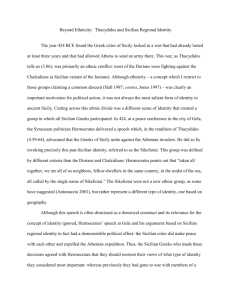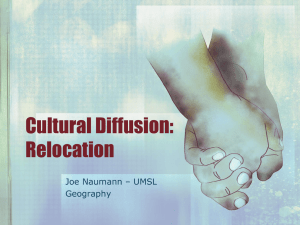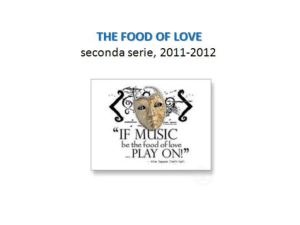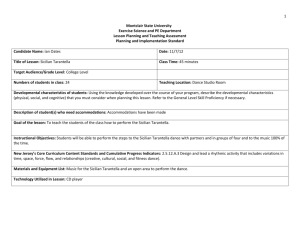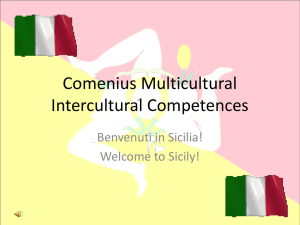Aims
advertisement
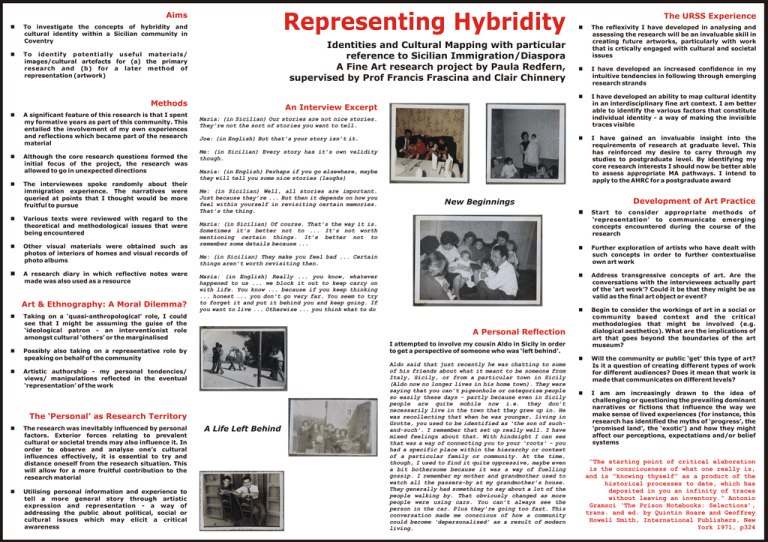
Representing Hybridity Aims n n To investigate the concepts of hybridity and cultural identity within a Sicilian community in Coventry Identities and Cultural Mapping with particular reference to Sicilian Immigration/Diaspora A Fine Art research project by Paula Redfern, supervised by Prof Francis Frascina and Clair Chinnery To identify potentially useful materials/ images/cultural artefacts for (a) the primary research and (b) for a later method of representation (artwork) Methods n n n n n n A significant feature of this research is that I spent my formative years as part of this community. This entailed the involvement of my own experiences and reflections which became part of the research material Although the core research questions formed the initial focus of the project, the research was allowed to go in unexpected directions The interviewees spoke randomly about their immigration experience. The narratives were queried at points that I thought would be more fruitful to pursue Various texts were reviewed with regard to the theoretical and methodological issues that were being encountered Other visual materials were obtained such as photos of interiors of homes and visual records of photo albums A research diary in which reflective notes were made was also used as a resource Art & Ethnography: A Moral Dilemma? n n n n Joe: (in English) But that’s your story isn’t it. n I have developed an increased confidence in my intuitive tendencies in following through emerging research strands n I have developed an ability to map cultural identity in an interdisciplinary fine art context. I am better able to identify the various factors that constitute individual identity - a way of making the invisible traces visible n I have gained an invaluable insight into the requirements of research at graduate level. This has reinforced my desire to carry through my studies to postgraduate level. By identifying my core research interests I should now be better able to assess appropriate MA pathways. I intend to apply to the AHRC for a postgraduate award Me: (in Sicilian) Every story has it’s own validity though. Maria: (in English) Perhaps if you go elsewhere, maybe they will tell you some nice stories (laughs) Me: (in Sicilian) Well, all stories are important. Just because they’re ... But then it depends on how you feel within yourself in revisiting certain memories. That’s the thing. Development of Art Practice New Beginnings Maria: (in Sicilian) Of course. That’s the way it is. Sometimes it’s better not to ... It’s not worth mentioning certain things. It’s better not to remember some details because ... n Start to consider appropriate methods of ‘representation’ to communicate emerging concepts encountered during the course of the research n Further exploration of artists who have dealt with such concepts in order to further contextualise own art work n Address transgressive concepts of art. Are the conversations with the interviewees actually part of the ‘art work’? Could it be that they might be as valid as the final art object or event? n Begin to consider the workings of art in a social or community based context and the critical methodologies that might be involved (e.g. dialogical aesthetics). What are the implications of art that goes beyond the boundaries of the art museum? n Will the community or public ‘get’ this type of art? Is it a question of creating different types of work for different audiences? Does it mean that work is made that communicates on different levels? n I am am increasingly drawn to the idea of challenging or questioning the prevailing dominant narratives or fictions that influence the way we make sense of lived experiences (for instance, this research has identified the myths of ‘progress’, the ‘promised land’, the ‘exotic’) and how they might affect our perceptions, expectations and/or belief systems Me: (in Sicilian) They make you feel bad ... Certain things aren’t worth revisiting then. Maria: (in English) Really ... you know, whatever happened to us ... we block it out to keep carry on with life. You know ... because if you keep thinking ... honest ... you don’t go very far. You seem to try to forget it and put it behind you and keep going. If you want to live ... Otherwise ... you think what to do A Personal Reflection I attempted to involve my cousin Aldo in Sicily in order to get a perspective of someone who was ‘left behind’. Possibly also taking on a representative role by speaking on behalf of the community Artistic authorship - my personal tendencies/ views/ manipulations reflected in the eventual ‘representation’ of the work Utilising personal information and experience to tell a more general story through artistic expression and representation - a way of addressing the public about political, social or cultural issues which may elicit a critical awareness The reflexivity I have developed in analysing and assessing the research will be an invaluable skill in creating future artworks, particularly with work that is crtically engaged with cultural and societal issues Maria: (in Sicilian) Our stories are not nice stories. They’re not the sort of stories you want to tell. Taking on a ‘quasi-anthropological’ role, I could see that I might be assuming the guise of the ‘ideological patron - an interventionist role amongst cultural ‘others’ or the marginalised The research was inevitably influenced by personal factors. Exterior forces relating to prevalent cultural or societal trends may also influence it. In order to observe and analyse one’s cultural influences effectively, it is essential to try and distance oneself from the research situation. This will allow for a more fruitful contribution to the research material n An Interview Excerpt The ‘Personal’ as Research Territory n The URSS Experience A Life Left Behind Aldo said that just recently he was chatting to some of his friends about what it meant to be someone from Italy, Sicily, or from a particular town in Sicily (Aldo now no longer lives in his home town). They were saying that you can’t pigeonhole or categorise people so easily these days - partly because even in Sicily people are quite mobile now i.e. they don’t necessarily live in the town that they grew up in. He was recollecting that when he was younger, living in Grotte, you used to be identified as ‘the son of suchand-such’. I remember that set up really well. I have mixed feelings about that. With hindsight I can see that was a way of connecting you to your ‘roots’ - you had a specific place within the hierarchy or context of a particular family or community. At the time, though, I used to find it quite oppressive, maybe even a bit bothersome because it was a way of fuelling gossip. I remember my mother and grandmother used to watch all the passers-by at my grandmother’s house. They generally had something to say about a lot of the people walking by. That obviously changed as more people were using cars. You can’t always see the person in the car. Plus they’re going too fast. This conversation made me conscious of how a community could become ‘depersonalised’ as a result of modern living. “The starting point of critical elaboration is the consciousness of what one really is, and is “knowing thyself” as a product of the historical processes to date, which has deposited in you an infinity of traces without leaving an inventory.” Antonio Gramsci ‘The Prison Notebooks: Selections’, trans. and ed. by Quintin Hoare and Geoffrey Howell Smith, International Publishers, New York 1971, p324

